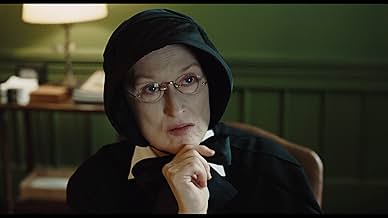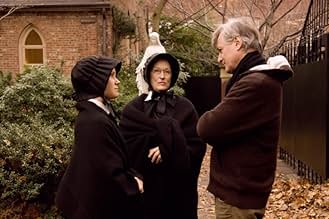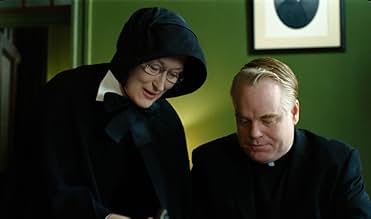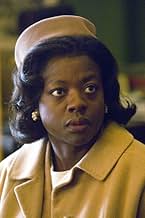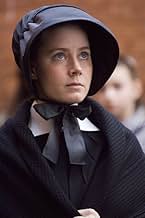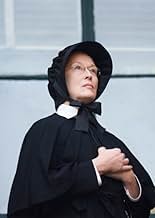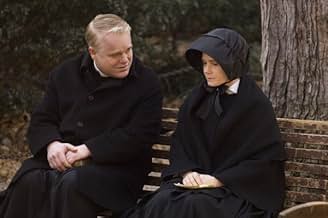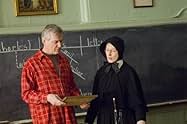A diretora de uma escola católica questiona a relação ambígua de um padre com um jovem estudante problemático.A diretora de uma escola católica questiona a relação ambígua de um padre com um jovem estudante problemático.A diretora de uma escola católica questiona a relação ambígua de um padre com um jovem estudante problemático.
- Direção
- Roteirista
- Artistas
- Indicado a 5 Oscars
- 25 vitórias e 97 indicações no total
Joseph Foster
- Donald Miller
- (as Joseph Foster II)
Avaliações em destaque
10kosmasp
And when I say dark, I'm not referring to the clothes in the movie. It's morally ambiguous and it might leave you with more questions than answers, but it's striking nevertheless. The powerhouse performances we get to see in this movie, are worthy Oscar contenders and leave free interpretations as to which character will be to your liking (or which character you despise the most).
While many movies do give you moral clarity, this one plays with many things, that are never fully uncovered ... or maybe they are and I'm just not willing to accept them? Actually it leaves room for some interpretations of things that went down (no pun intended). It's about guilt, it's about doubt and many other things, that makes us human. How you receive the movie might say a lot more about yourself than the movie itself. Which is a great thing. A movie that actually makes you think, even long after the credits finished ...
While many movies do give you moral clarity, this one plays with many things, that are never fully uncovered ... or maybe they are and I'm just not willing to accept them? Actually it leaves room for some interpretations of things that went down (no pun intended). It's about guilt, it's about doubt and many other things, that makes us human. How you receive the movie might say a lot more about yourself than the movie itself. Which is a great thing. A movie that actually makes you think, even long after the credits finished ...
As someone who lived this drama (unfortunately in all its aspects), I was transported back in time. The portrayal of Sister Aloysius in particular was stunningly accurate. It was a bit uncomfortable to watch only in that it rekindled those old memories, but the acting was outstanding.
Watch this movie once, with the idea that Fr. Flynn is guilty. Then watch it again, with the idea that he is innocent. Or do it the other way around. Shanley's dialogue is so perfectly, brilliantly ambiguous that this is really two movies in one. Both are powerful, and both possibilities are horrible to contemplate, for very different reasons.
Having seen both the play (during its original run with Cherry Jones and Brian F. O'Byrne) and the film, the play obviously has the edge because it's more intimate, consisting only of four characters. The film expands its milieu (as film versions of plays typically do) but I think having the schoolchildren, other nuns, and school staff present in the film diminishes it just a bit. The play, of course, is about "knowing" things that we don't actually know, and the movie shows us some of what the play leaves to the imagination. Although the ultimate question remains ambiguous, the viewer may be distracted by looking for clues in the other characters, especially the kids.
What gives this piece its power, though, on both stage and screen, is its stubborn refusal to answer that ultimate question, or to provide any solid evidence of either conclusion, leaving it entirely up to the viewer to judge these characters.
Having seen both the play (during its original run with Cherry Jones and Brian F. O'Byrne) and the film, the play obviously has the edge because it's more intimate, consisting only of four characters. The film expands its milieu (as film versions of plays typically do) but I think having the schoolchildren, other nuns, and school staff present in the film diminishes it just a bit. The play, of course, is about "knowing" things that we don't actually know, and the movie shows us some of what the play leaves to the imagination. Although the ultimate question remains ambiguous, the viewer may be distracted by looking for clues in the other characters, especially the kids.
What gives this piece its power, though, on both stage and screen, is its stubborn refusal to answer that ultimate question, or to provide any solid evidence of either conclusion, leaving it entirely up to the viewer to judge these characters.
Wow! Incredible performances from Meryl Streep and Philip Seymore Hoffman. Mesmerizing intensity from Streep as the nun seeking to find Hoffman guilty of a sin he may or may not have committed. Amy Adams gives a sincere performance as the nun who sets the ball rolling with her suspicions that Hoffman may have molested a black student. The scenes between Streep and Hoffman crackle with intelligence and frightening intensity. Streep, as the unrelenting figure of justice, determined at any cost to destroy Hoffman, is terrifying and unrelenting. Hoffman gives a performance less restrained and mannered than the one he gave in Capote (and won the Oscar for) and boy, does he ever deserve to have won a second one for this outing. An absolute knockout, nuanced and convincing in every way. What a masterful performance! John Patrick Shanley's script is riveting from start to finish. If anyone has any doubts about watching this movie due to the theme then put those doubts aside as the writing and acting are without doubt amongst the finest ever committed to film. A superb piece of work.
In 1964 the winds of change are sweeping through Sister Aloysius' (Meryl Streep) St. Nicholas school. Father Flynn (Philip Seymour Hoffman), a charismatic priest, is advocating reform of the school's strict customs, and the first black student has just been accepted. When a fellow nun (Amy Adams) tells Sister Aloysius that Father Flynn may be paying too much personal attention to the student, Sister Aloysius begins a personal crusade against the priest -- despite her lack of evidence.
A Catholic grade school could seem like a hermetically sealed world in 1964. That's the case with St. Nicholas in the Bronx, ruled by the pathologically severe principal Sister Aloysius, who keeps the students and nuns under her thumb and is engaged in an undeclared war with the new parish priest. Their issues may seem to center around the reforms of Vatican II, then still under way, with Father Flynn (Philip Seymour Hoffman) as the progressive, but for the nun I believe it's more of a power struggle. The pope's infallibility seems, in her case, to have descended to the parish level.
Some will say the character of Sister Aloysius, played without a hint of humor .
Sister Aloysius of "Doubt" hates all inroads of the modern world, including ballpoint pens. This is accurate. We practiced our penmanship with fountain pens, carefully heading every page "JMJ" -- for Jesus, Mary and Joseph, of course. Under Aloysius' command is the sweet young Sister James, whose experience in the world seems limited to what she sees out the convent window. Gradually during the autumn semester, the situation develops.
There is one African-American student at St. Nicholas, Donald Miller, and Father Flynn encourages him in sports and appoints him as an altar boy. This is all proper. Then Sister James notes that the priest summons the boy to the rectory alone. She decides this is improper behavior, and informs Aloysius, whose eyes narrow like a beast of prey. Father Flynn's fate is sealed.
But "Doubt" is not intended as a docudrama about possible sexual abuse. It is about the title word, doubt, in a world of certainty. For Aloysius, Flynn is certainly guilty. That the priest seems innocent, that Sister James comes to believe she was mistaken in her suspicions, means nothing. Flynn knows a breath of scandal would destroy his career. And that is the three-way standoff we watch unfolding with precision and tension.
Something else happens. Donald's mother fears her son will be expelled from the school. He has been accused of drinking the altar wine. Worse, of being given it by Father Flynn. She appeals directly to Sister Aloysius. It lasts about 10 minutes, but it is the emotional heart and soul of "Doubt".
Doubt. It is the subject of the sermon Father Flynn opens the film with. Doubt was coming into the church and the United States in 1964. After the assassination of Kennedy and the beginnings of Vietnam, doubt had undermined American certainty in general. What could you be sure of? What were the circumstances? The motives? The conflict between Aloysius and Flynn is the conflict between old and new, between status and change, between infallibility and uncertainty. And Shanley leaves us doubting. "Doubt" has exact and merciless writing, powerful performances and timeless relevance. It causes us to start thinking with the first shot, and we never stop. Think how rare that is in a film.
I came to a different conclusion seeing this film. The entitled "doubt" was not about Father Flynn's guilt (which I believe becomes apparent toward the end of the film). The "doubt" is manifested in Sister Aloysius as she comes to doubt the institution of the Catholic Church she has devoted her life to. Instead of getting rid of the priest, the church covers up the crime. I think that would be enough to cause anyone to have "doubts". This was the last straw that caused this nun to have an emotional break down, reducing a once rigid woman certain in her beliefs to a sobbing and lost wreck of a human being.
To answer the obvious mystery in the film - whether Father had some sinful (or criminal) relationship with a twelve year boy? The one word answer on the platter is 'Yes'. I don't think the plot of this movie made a lot of sense for its 1964 setting. Would a nun in 1964 really suspect a priest of sexual abuse based on nothing more than a shirt being placed in a locker? In 2018, after two decades of priest abuse stories in the media, sure; however, in 1964, at a time when no one would dare criticize a man of the cloth, I have my doubts. Either way, I did enjoy the film and thought it was well-acted.
Você sabia?
- CuriosidadesPhilip Seymour Hoffman lobbied for Amy Adams to be a part of the movie, even threatening to leave the project if she wasn't cast.
- Erros de gravaçãoSister Aloysius says the people of ancient Sparta resolved issues by who shouted the loudest. It was actually the ancient Athenians who did that.
People, even nuns, sometimes mix up history facts.
- Citações
Father Brendan Flynn: Doubt can be a bond as powerful and sustaining as certainty. When you are lost, you are not alone.
- ConexõesFeatured in The 14th Annual Critics' Choice Awards (2009)
- Trilhas sonorasReginella Campagnola
Written by Eldo Di Lazzaro, Bruno Cherubini (as C. Bruno)
Principais escolhas
Faça login para avaliar e ver a lista de recomendações personalizadas
Detalhes
- Data de lançamento
- País de origem
- Centrais de atendimento oficiais
- Idioma
- Também conhecido como
- La duda
- Locações de filme
- Empresas de produção
- Consulte mais créditos da empresa na IMDbPro
Bilheteria
- Orçamento
- US$ 20.000.000 (estimativa)
- Faturamento bruto nos EUA e Canadá
- US$ 33.446.470
- Fim de semana de estreia nos EUA e Canadá
- US$ 507.226
- 14 de dez. de 2008
- Faturamento bruto mundial
- US$ 51.699.984
- Tempo de duração
- 1 h 44 min(104 min)
- Cor
- Mixagem de som
- Proporção
- 1.85 : 1
Contribua para esta página
Sugerir uma alteração ou adicionar conteúdo ausente




